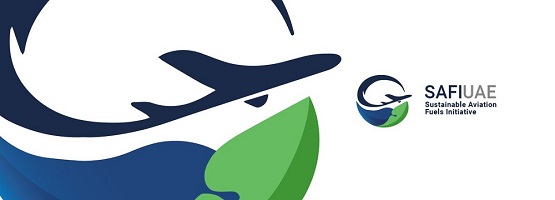Session 2
Title: Pathways to Produce SAF
Date/Time: 11 August 2020, 5:30pm – 6:30pm UAE Time
Format – moderated panel session
- Moderator
- Alejandro Rios-Galvan (Director – Sustainable Bioenergy Research Consortium, Khalifa University of Science and Technology, UAE)
- Panelists
- Mark Rumizen (Senior Technical Specialist, Aviation Fuels, Federal Aviation Administration, USA)
- Bruno Miller (Managing Director – Fuels, Fulcrum Bioenergy, USA)
- Jennifer Holmgren (Chief Executive Officer, Lanzatech, USA)
- Session attendees will come away with insights into:
- An understanding of the fuel approval process for SAF
- The annexes that have been approved up to date and the ones that are on the pipeline
- A look at some of the most relevant projects that are being developed worldwide
- The current and future technologies that can be used for producing SAF
- The challenges for developing refining infrastructure for SAF and getting it to market
Speaker Bios

Mark Rumizen has been the Federal Aviation Administration’s (FAA’s) regulatory and technical expert for aviation fuels for over two decades. He has been employed by the FAA since 1991 and is currently the Senior Technical Specialist for aviation fuels in the Aircraft Certification Division. He is also a member of the Commercial Aviation Alternative Fuels Initiative (CAAFI) steering committee and is the leader of the CAAFI Certification & Qualification Panel. He serves on the Executive Subcommittee of the ASTM International Aviation Fuels Subcommittee and is the chairman of that subcommittee’s Emerging Fuels section.

Dr. Bruno Miller is Managing Director of Fuels and Regulatory Affairs at Fulcrum Bioenergy, a pioneer in the development of a reliable and efficient process for transforming everyday household garbage into low-carbon transportation fuels including jet fuel and diesel. He is responsible for directing Fulcrum´s fuels activities including sales, logistics, regulatory compliance, and sustainability. Dr. Miller has more than 20 years of experience in the air transportation industry. As a strategic sourcing manager in the fuel department at Northwest and Delta Airlines, he was responsible for the airline’s fuel supply chain in the U.S. Northeast, Latin America and Africa, including major airports in New York, Boston and Washington D.C. As Principal of Energy and Environment at Metron Aviation, he analyzed and developed strategies to strengthen the leadership of major global airlines on sustainability and environmental performance. Dr. Miller has been Principal Investigator in a number of projects for the National Academy of Science’s Airport Cooperative Research Program (ACRP) and was the co-chairman of the business team of the Commercial Aviation Alternative Fuels Initiative (CAAFI). He holds a Ph.D. in Air Transportation Systems as well as a M.S. and B.S. in Aeronautics and Astronautics and a M.S. in Technology and Policy from the Massachusetts Institute of Technology (MIT).

Dr. Jennifer Holmgren is CEO of revolutionary carbon recycling company, LanzaTech. Prior to LanzaTech, Jennifer was VP and General Manager of the Renewable Energy and Chemicals business unit at UOP LLC, a Honeywell Company. Under her management, UOP technology became instrumental in producing nearly all of the initial fuels used by commercial airlines and the military for testing and certification of alternative aviation fuel. Today, under Jennifer’s guidance, LanzaTech is working towards deploying carbon capture and reuse facilities globally to make fuels and chemicals from waste carbon. In 2015, Jennifer and her team at LanzaTech were awarded the U.S. Environmental Protection Agency Presidential Green Chemistry Award and she received the BIO Rosalind Franklin Award for Leadership in Industrial Biotechnology and the Outstanding Leader Award in Corporate Social Innovation from the YWCA Metropolitan Chicago. She was named most influential leader in the Bioeconomy by Biofuels Digest in 2017 and received the Digest Global Bioenergy Leadership Award in 2018. A member of the National Academy of Engineering, a dog lover and committed greyhound rescuer, Jennifer holds a B.Sc. degree from Harvey Mudd College, a Ph.D. from the University of Illinois at Urbana-Champaign and an MBA from the University of Chicago. Jennifer is also the Director and Chair of the LanzaJet Board of Directors. LanzaJet, Inc., is a new company that will produce sustainable aviation fuel (SAF) for a sector requiring climate friendly fuel options.
Session 3
Title: Sustainable Aviation Fuel Initiatives Around the World
Date/Time: 18 August 2020, 5:30pm – 6:45pm UAE Time
Format – moderated panel session
- Moderator
- Alejandro Rios-Galvan (Director – Sustainable Bioenergy Research Consortium, Khalifa University of Science and Technology, UAE)
- Panelists
- Steve Csonka (Executive Director – Commercial Aviation Alternative Fuels Initiative (CAAFI), USA)
- Kateryna Derkach (Director Strategy and Sustainability, Green Aviation Research and Development Network (GARDN), Canada)
- Pedro Scorza (Director de Biocombustíveis de Aviação na Ubrabio, Brazil)
- Session attendees will come away with insights into:
- An understanding of the different initiatives that have been launched around the world to promote SAFs
- Managing a SAF initiative and governance structure
- Stakeholder engagement process for SAF initiatives
- Best practices for initiatives working on SAF
Session 4
Title: Global Lessons on SAF
Date/Time: 25 August 2020, 5:30pm – 7pm UAE Time
Format – moderated panel session
Session attendees will come away with insights into:
- The efforts worldwide for promoting SAFs from different perspectives
- The view from an airline
- The view from an OEM
- The view from a distributor of SAF
- The view from a promoter
- What has worked? What hasn’t?
- What is needed to get to the long-term goal?
- Recommendations from the industry to realize SAFs
Session 5
Title: The Role of the Oil and Gas Industry in the Development of SAF
Date/Time: 1 September 2020, 3pm – 4:15pm UAE Time
Format – moderated panel session
Session attendees will come away with insights into:
- The initiatives that are being undertaken by the oil and gas (O&G) majors around the world to produce SAF and reduce aviation’s carbon footprint
- What are the key technologies that are used in the oil and gas industry to produce SAF
- CCUS
- Hydrogen production
- Hydrotreatment
- What is the role of the O&G industry moving forward in the production of SAF
Session 6
Title: Regional Constraints and Opportunities for the Production of SAF
Date/Time: 8 September 2020, 3pm – 4pm UAE Time
Format – moderated panel session
Session attendees will come away with insights into:
- The constraints and opportunities that are available in this region of the world
- No biomass at scale
- Large energy infrastructure investments
- Low-cost low-carbon energy sources
- The strategic role of the aviation industry for the UAE
- The importance of Low Carbon Aviation Fuels (LCAF) in the energy portfolio for the aviation industry
- How can policy help in the development of SAF for this region?
Session 7
Title: Best Practices and Crossover Points for SAFI-UAE
Date/Time: 15 September 2020, 10am – 11:30am UAE Time
Format – moderated panel session
Session attendees will come away with insights into:
- Technology: several technological pathways have been established to produce SAF and a discussion will be held on the ones that are most applicable in the UAE and how they can be implemented
- Policy: a number of policy options are available for the deployment of SAF and the ones most applicable to the UAE will be discussed
- Sustainability: all aspects of sustainability (environmental, economic, social) need to be considered, and an exploration of the certification schemes that will be available to ensure compliance with CORSIA will be done, together with a discussion on optimizing carbon management
- R&D: there are several research tracks that could benefit the development of SAF in the UAE, and this will be explored
- Business Development: a discussion of how to “connect the dots” so that projects to produce SAF can be integrated across industrial sectors, working to secure the necessary financing and stakeholder involvement will be discussed
- The views from the different strategic sectors of the UAE for producing SAF
- What are possible objectives and pathways for developing the SAF industry in the UAE?
- The importance and strengths of the UAE to become a world leader in the production of SAF
Session 8
Title: Stakeholder Engagement for SAFI-UAE
Date/Time: 30 September 2020, 10am UAE Time
Format – in-person stakeholder engagement session at KU
- Moderator
- Alejandro Rios-Galvan (Director – Sustainable Bioenergy Research Consortium, Khalifa University of Science and Technology, UAE)
- Participants
- Aircraft operators: Etihad Airways, Emirates, Fly Dubai, Air Arabia
- Airports: Abu Dhabi Airports Company, Dubai Airports, Sharjah International Airport
- Aircraft manufacturers: The Boeing Company, Airbus
- Engine manufacturers: Rolls-Royce, GE, CFM, Safran
- Oil & Gas
- Producers: Abu Dhabi National Oil Company, Emirates National Oil Company, Saudi ARAMCO, BP, Shell, Oxy, ExxonMobil, Total, ENI
- Technology providers: UOP-Honeywell, Axens
- Support industries
- Energy: Masdar, Siemens, Marubeni, Lanzatech, AVL
- Government
- Federal: Ministry of Climate Change and Environment, Ministry of Energy and Industry, Ministry of Cabinet Affairs and the Future, Ministry of Defence, Ministry of Economy, General Civil Aviation Authority
- State/Local: Environment Agency Abu Dhabi, Department of Energy, Department of Municipalities and Transport
- Companies: Dubai Electricity and Water Authority, Emirates Nuclear Energy Corporation, Abu Dhabi Power Corporation, Emirates Water and Electricity Company, Tadweer
- Academia
- Universities: Khalifa University of Science and Technology, NYU Abu Dhabi, United Arab Emirates University, American University of Sharjah
- International Organizations
- Aviation: International Civil Aviation Organization, International Air Transport Association, Airports Council International
- Non-Governmental Organizations: Emirates Nature WWF
- Energy: International Renewable Energy Agency
- Finance
- Banks: HSBC, First Abu Dhabi Bank, etc.
- Others: Abu Dhabi Global Markets, Mubadala
- SAF Producers
- Projects: Fulcrum Bioenergy, Velocys, Neste Oil, World Energy, Lanzatech
- The session will focus on communicating the following objectives:
- Establish SAFI-UAE and define the work program
- Engage and recruit all the necessary stakeholders to participate in SAFI
- Work on defining the best pathways to focus on for establishing pilot/demonstration projects for at least 3 of the feedstock/conversion pathways
The purpose of SAFI-UAE will be to underpin the creation of the SAF industry in the UAE. It will reinforce the overall objective of creating a knowledge-based economy and confirm the UAE’s position as a world leader in the energy and aviation sectors by creating viable business models for the production of SAF.




 Format
Format